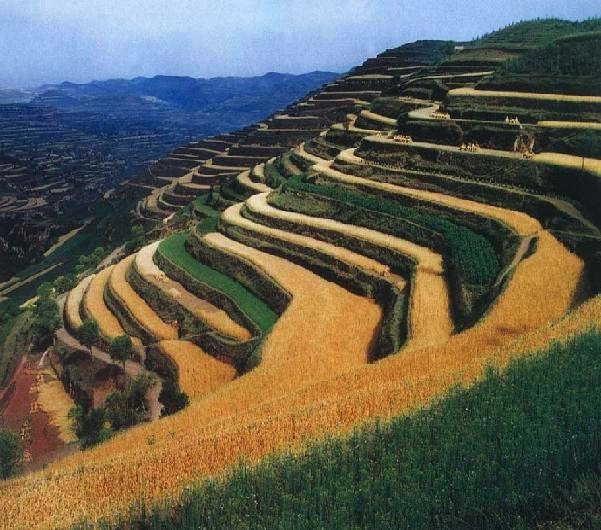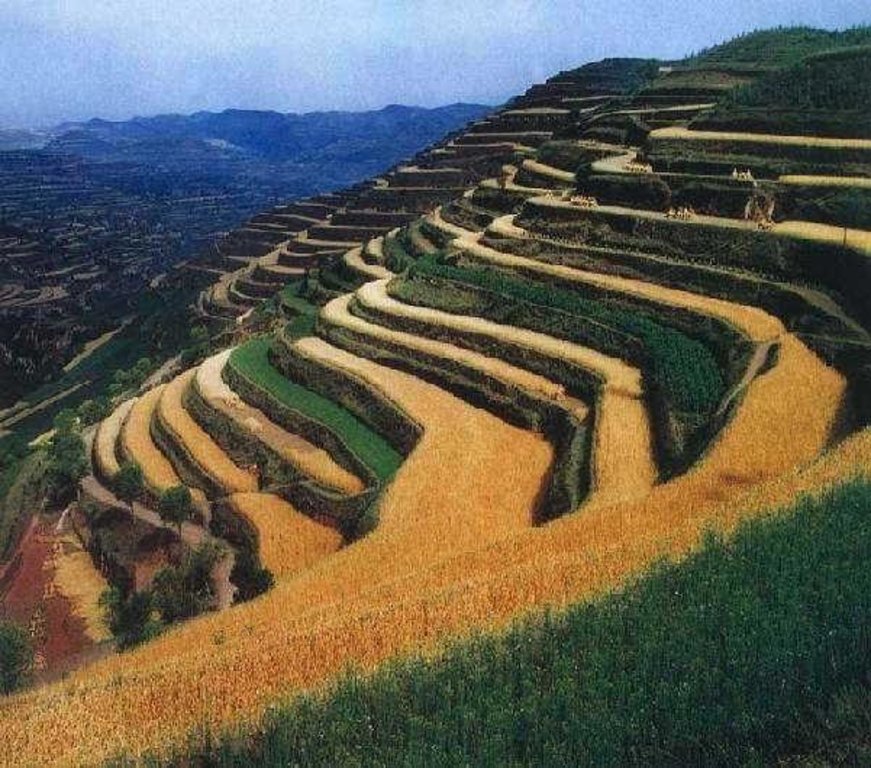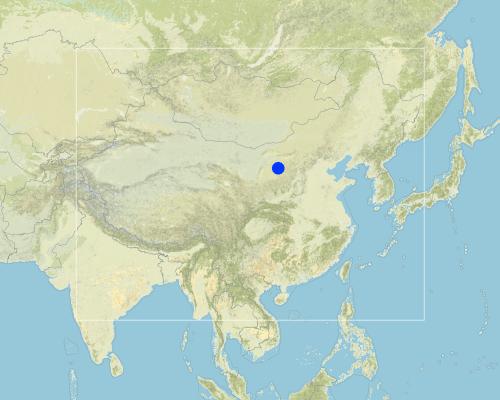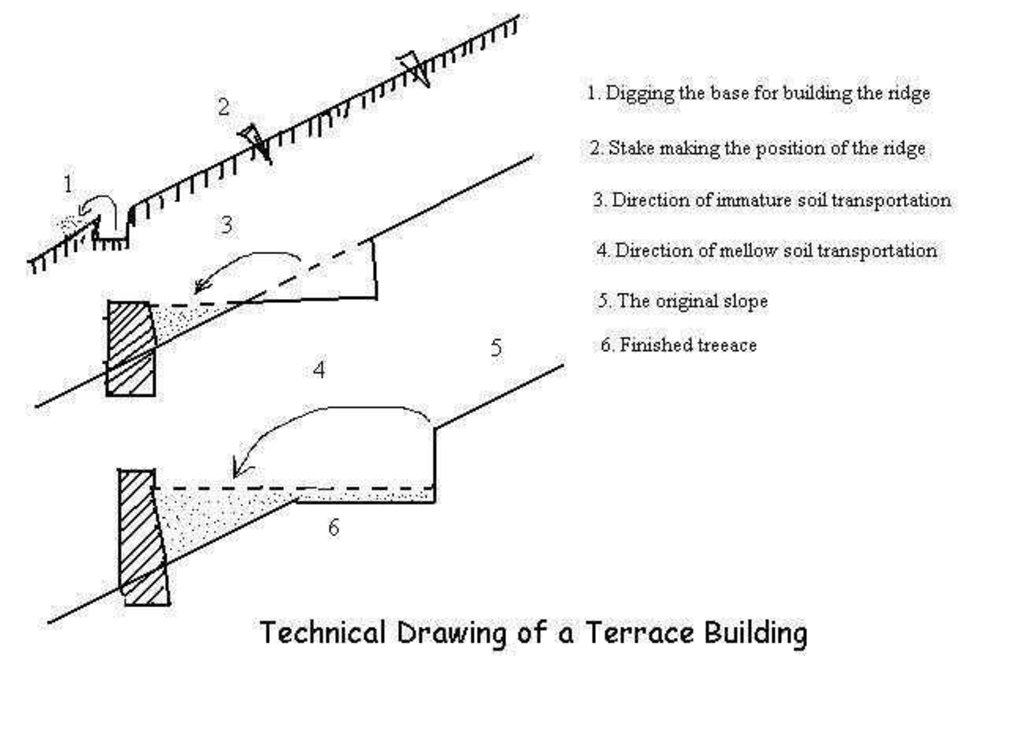Terrace [จีน]
- ผู้สร้างสรรค์:
- การอัพเดท:
- ผู้รวบรวม: Meili WEN
- ผู้เรียบเรียง: –
- ผู้ตรวจสอบ: David Streiff
Terrace
technologies_1367 - จีน
ดูส่วนย่อย
ขยายทั้งหมด ย่อทั้งหมด1. ข้อมูลทั่วไป
1.2 รายละเอียดที่ติดต่อได้ของผู้รวบรวมและองค์กรที่เกี่ยวข้องในการประเมินและการจัดเตรียมทำเอกสารของเทคโนโลยี
ชื่อขององค์กรซึ่งอำนวยความสะดวกในการทำเอกสารหรือการประเมินเทคโนโลยี (ถ้าเกี่ยวข้อง)
Department of Resources and Environmental Science, Beijing Normal University (Department of Resources and Environmental Science, Beijing Normal University) - จีน1.3 เงื่อนไขการใช้ข้อมูลที่ได้บันทึกผ่านทาง WOCAT
วันที่เก็บรวบรวมข้อมูล(ภาคสนาม) :
18/05/2002
ผู้รวบรวมและวิทยากรหลักยอมรับเงื่อนไขเกี่ยวกับการใช้ข้อมูลที่ถูกบันทึกผ่านทาง WOCAT:
ใช่
2. การอธิบายลักษณะของเทคโนโลยี SLM
2.1 การอธิบายแบบสั้น ๆ ของเทคโนโลยี
คำจำกัดความของเทคโนโลยี:
A terrace is a kind of measure to change the slope, which has a raised bank of earth or stone with vertical or sloping sides and a approximately flat top.
2.2 การอธิบายแบบละเอียดของเทคโนโลยี
คำอธิบาย:
A terrace has a raised bank of earth or stone with vertical or sloping sides and a approximately flat top. It can reduce slope angle and length, retain runoff, increase infiltration and reduce the soil loss. Crops can grow well because water increases in soils. Meanwhile, ground cover is improved. Terrace can be constructed by manual labor or machine. Firstly, determining the width of the field according to the slope angle and soil texture. Secondly, putting the topsoil aside. Thirdly, leveling up the slope and constructing banks. At last, putting the topsoil to the top of the flat surface.
2.3 รูปภาพของเทคโนโลยี
2.5 ประเทศภูมิภาค หรือสถานที่ตั้งที่เทคโนโลยีได้นำไปใช้และได้รับการครอบคลุมโดยการประเมินนี้
ประเทศ:
จีน
ภูมิภาค/รัฐ/จังหวัด:
Shaanxi, Shanxi, Inner Mongolia, Henan, Gansu
Map
×2.6 วันที่การดำเนินการ
ถ้าไม่รู้ปีที่แน่นอน ให้ระบุวันที่โดยประมาณ:
- มากกว่า 50 ปี (แบบดั้งเดิม)
2.7 คำแนะนำของเทคโนโลยี
ให้ระบุว่าเทคโนโลยีถูกแนะนำเข้ามาอย่างไร:
- เป็นส่วนหนึ่งของระบบแบบดั้งเดิมที่ทำก้นอยู่ (> 50 ปี)
ความคิดเห็น (ประเภทของโครงการ เป็นต้น) :
Summary from farmers' long term experience in SWC, later being innovated.
3. การจัดประเภทของเทคโนโลยี SLM
3.1 วัตถุประสงค์หลักของเทคโนโลยี
- ลด ป้องกัน ฟื้นฟู การเสื่อมโทรมของที่ดิน
3.2 ประเภทของการใช้ที่ดินในปัจจุบันที่ได้นำเทคโนโลยีไปใช้

พื้นที่ปลูกพืช
- การปลูกพืชล้มลุกอายุปีเดียว
- การปลูกไม้ยืนต้น ไม้พุ่ม
พืชหลัก (พืชเศรษฐกิจและพืชอาหาร):
maize, Pease
แสดงความคิดเห็น:
Major land use problems (compiler’s opinion): Soil and water lose seriously, soil degrades, soil fertility decreases and crop yield declines.
Major land use problems (land users’ perception): crop yield declines, weak ability of resisting drought
3.3 ข้อมูลเพิ่มเติมเกี่ยวกับการใช้ที่ดิน
การใช้น้ำของที่ดินที่มีการใช้เทคโนโลยีอยู่:
- จากน้ำฝน
แสดงความคิดเห็น:
Water supply also mixed rainfed - irrigated
จำนวนของฤดูเพาะปลูกต่อปี:
- 1
ระบุ:
Longest growing period in days: 160Longest growing period from month to month: May-Sep
3.4 กลุ่ม SLM ที่ตรงกับเทคโนโลยีนี้
- มาตรการปลูกพืชขวางความลาดชัน (cross-slope measure)
3.5 กระจายตัวของเทคโนโลยี
ระบุการกระจายตัวของเทคโนโลยี:
- กระจายไปอย่างสม่ำเสมอในพื้นที่
ถ้าหากว่าเทคโนโลยีได้มีการกระจายออกไปอย่างสม่ำเสมอในพื้นที่ ให้ระบุปริมาณพื้นที่ที่ได้รับการครอบคลุมถึง:
- > 10,000 ตร.กม.
แสดงความคิดเห็น:
Total area covered by the SLM Technology is 26666.7 m2.
Terrace is one of the most outstanding achievements in SWC in China. It can prevent soil and water loss so that slope land can be sustainable development. There are about 26.7 million ha of terrace in China, of which more than 13.3
3.6 มาตรการ SLM ที่ประกอบกันเป็นเทคโนโลยี
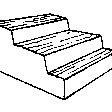
มาตรการอนุรักษ์ด้วยโครงสร้าง
- S1: คันดิน
3.7 รูปแบบหลักของการเสื่อมโทรมของที่ดินที่ได้รับการแก้ไขโดยเทคโนโลยี

การกัดกร่อนของดินโดยน้ำ
- Wt (Loss of topsoil): การสูญเสียดินชั้นบนหรือการกัดกร่อนที่ผิวดิน
แสดงความคิดเห็น:
Main type of degradation addressed: Wt: loss of topsoil / surface erosion
3.8 การป้องกัน การลดลง หรือการฟื้นฟูความเสื่อมโทรมของที่ดิน
ระบุเป้าหมายของเทคโนโลยีกับความเสื่อมโทรมของที่ดิน:
- ลดความเสื่อมโทรมของดิน
4. ข้อมูลจำเพาะด้านเทคนิค กิจกรรมการนำไปปฏิบัติใช้ ปัจจัยนำเข้า และค่าใช้จ่าย
4.1 แบบแปลนทางเทคนิคของเทคโนโลยี
4.2 ข้อมูลจำเพาะด้านเทคนิคและการอธิบายแบบแปลนทางเทคนิค
Drawings of a terrace building in the Loess Plateau
Location: the Loess Plateau. Shaanxi, Shanxi, Henan, Gansu, Inner Mongolia
Date: 2002
Technical knowledge required for field staff / advisors: high
Technical knowledge required for land users: low
Main technical functions: reduction of slope angle, reduction of slope length
Construction material (earth): Construct ridge of terrace
Construction material (stone): Construct ridge of terrace
Slope (which determines the spacing indicated above): 25%
If the original slope has changed as a result of the Technology, the slope today is: 10%
Lateral gradient along the structure: 80%
For water harvesting: the ratio between the area where the harvested water is applied and the total area from which water is collected is: 1:6
4.3 ข้อมูลทั่วไปเกี่ยวกับการคำนวณปัจจัยนำเข้าและค่าใช้จ่าย
ระบุสกุลเงินที่ใช้คำนวณค่าใช้จ่าย:
- ดอลลาร์สหรัฐ
ระบุค่าเฉลี่ยของค่าจ้างในการจ้างแรงงานต่อวัน:
3.00
4.4 กิจกรรมเพื่อการจัดตั้ง
| กิจกรรม | ประเภทของมาตรการ | ช่วงเวลาดำเนินการ | |
|---|---|---|---|
| 1. | survey | ด้วยโครงสร้าง | After harvesting crop |
| 2. | constructing terrace: determine the excavation line which should make the excavation and the filling equal and the least workload | ด้วยโครงสร้าง | After harvesting crop, before raining season |
| 3. | constructing terrace: pilling mellow soil up to the middle of a bench | ด้วยโครงสร้าง | After harvesting crop, before raining season |
| 4. | constructing terrace: moving the immature soil of lower part to fill the upper part or moving the soil from inside to fill up outside | ด้วยโครงสร้าง | After harvesting crop, before raining season |
| 5. | constructing terrace: building the ridge | ด้วยโครงสร้าง | After harvesting crop, before raining season |
| 6. | constructing terrace: spreading the mellow soil on the surface | ด้วยโครงสร้าง | After harvesting crop, before raining season |
4.5 ค่าใช้จ่ายของปัจจัยนำเข้าที่จำเป็นสำหรับการจัดตั้ง
แสดงความคิดเห็น:
Duration of establishment phase: 12 month(s)
4.6 การบำรุงรักษาสภาพหรือกิจกรรมที่เกิดขึ้นเป็นประจำ
| กิจกรรม | ประเภทของมาตรการ | ช่วงระยะเวลา/ความถี่ | |
|---|---|---|---|
| 1. | periodically inspecting | ด้วยโครงสร้าง | After a storm/About 1 year |
| 2. | repairing where terrace is collapsed | ด้วยโครงสร้าง | Whenever finding it is destroyed/timely |
| 3. | level up the field | ด้วยโครงสร้าง | after harvesting crops/timely |
4.7 ค่าใช้จ่ายของปัจจัยนำเข้าและกิจกรรมที่เกิดขึ้นเป็นประจำที่ต้องการการบำรุงรักษา (ต่อปี)
แสดงความคิดเห็น:
Terrace section, building by bulldozer.
4.8 ปัจจัยสำคัญที่สุดที่มีผลกระทบต่อค่าใช้จ่าย
ปัจจัยสำคัญที่สุดที่มีผลกระทบต่อค่าใช้จ่ายต่างๆ:
The factors are topography, soil texture, means of construction. The section of terrace is the most important factor.
5. สิ่งแวดล้อมทางธรรมชาติและของมนุษย์
5.1 ภูมิอากาศ
ฝนประจำปี
- < 250 ม.ม.
- 251-500 ม.ม.
- 501-750 ม.ม.
- 751-1,000 ม.ม.
- 1,001-1,500 ม.ม.
- 1,501-2,000 ม.ม.
- 2,001-3,000 ม.ม.
- 3,001-4,000 ม.ม.
- > 4,000 ม.ม.
ระบุปริมาณน้ำฝนเฉลี่ยรายปี (ถ้ารู้) :หน่วย ม.ม.
449.00
เขตภูมิอากาศเกษตร
- กึ่งแห้งแล้ง
5.2 สภาพภูมิประเทศ
ค่าเฉลี่ยความลาดชัน:
- ราบเรียบ (0-2%)
- ลาดที่ไม่ชัน (3-5%)
- ปานกลาง (6-10%)
- เป็นลูกคลื่น (11-15%)
- เป็นเนิน (16-30%)
- ชัน (31-60%)
- ชันมาก (>60%)
ธรณีสัณฐาน:
- ที่ราบสูง/ที่ราบ
- สันเขา
- ไหล่เขา
- ไหล่เนินเขา
- ตีนเนิน
- หุบเขา
ระดับความสูง:
- 0-100 เมตร
- 101-500 เมตร
- 501-1,000 เมตร
- 1,001-1,500 เมตร
- 1,501-2,000 เมตร
- 2,001-2,500 เมตร
- 2,501-3,000 เมตร
- 3,001-4,000 เมตร
- > 4,000 เมตร
ความคิดเห็นและข้อมูลจำเพาะเพิ่มเติมเรื่องสภาพภูมิประเทศ:
Slopes on average also rolling
5.3 ดิน
ค่าเฉลี่ยความลึกของดิน:
- ตื้นมาก (0-20 ซ.ม.)
- ตื้น (21-50 ซ.ม.)
- ลึกปานกลาง (51-80 ซ.ม.)
- ลึก (81-120 ซ.ม.)
- ลึกมาก (>120 ซ.ม.)
เนื้อดิน (ดินชั้นบน):
- ปานกลาง (ดินร่วน ทรายแป้ง)
อินทรียวัตถุในดิน:
- ต่ำ (<1%)
(ถ้ามี) ให้แนบคำอธิบายเรื่องดินแบบเต็มหรือระบุข้อมูลที่มีอยู่ เช่น ชนิดของดิน ค่า pH ของดินหรือความเป็นกรดของดิน ความสามารถในการแลกเปลี่ยนประจุบวก ไนโตรเจน ความเค็ม เป็นต้น:
Soil fertility: low
Soil drainage / infiltration: good
Soil water storage capacity: low
5.6 ลักษณะของผู้ใช้ที่ดินที่นำเทคโนโลยีไปปฏิบัติใช้
รายได้ที่มาจากนอกฟาร์ม:
- 10-50% ของรายได้ทั้งหมด
ระดับของความมั่งคั่งโดยเปรียบเทียบ:
- พอมีพอกิน
- รวย
ระดับของการใช้เครื่องจักรกล:
- การใช้กำลังจากสัตว์
- การใช้เครื่องจักรหรือเครื่องยนต์
ระบุลักษณะอื่นๆที่เกี่ยวข้องของผู้ใช้ที่ดิน:
Population density: 100-200 persons/km2
Annual population growth: < 0.5%
Relative level of wealth: all selected
Relative level of wealth: very rich, rich, average, poor, very poor
5% of the land users are very rich and own 10% of the land.
10% of the land users are rich and own 10% of the land.
70% of the land users are average wealthy and own 60% of the land.
10% of the land users are poor and own 10% of the land.
5% of the land users are poor and own 10% of the land.
Off-farm income specification: estimate
5.8 กรรมสิทธิ์ในที่ดิน สิทธิในการใช้ที่ดินและสิทธิในการใช้น้ำ
กรรมสิทธิ์ในที่ดิน:
- รัฐ
- เป็นแบบชุมชนหรือหมู่บ้าน
6. ผลกระทบและสรุปคำบอกกล่าว
6.1 ผลกระทบในพื้นที่ดำเนินการ (On-site) จากการใช้เทคโนโลยี
ผลกระทบด้านนิเวศวิทยา
วัฐจักรน้ำหรือน้ำบ่า
น้ำไหลบ่าที่ผิวดิน
จำนวนก่อน SLM:
10
หลังจาก SLM:
4
ดิน
การสูญเสียดิน
จำนวนก่อน SLM:
180
หลังจาก SLM:
58
6.4 การวิเคราะห์ค่าใช้จ่ายและผลประโยชน์ที่ได้รับ
ผลประโยชน์ที่ได้รับเปรียบเทียบกับค่าใช้จ่ายในการจัดตั้งเป็นอย่างไร (จากมุมมองของผู้ใช้ที่ดิน)
ผลตอบแทนระยะสั้น:
ด้านลบอย่างมาก
ผลตอบแทนระยะยาว:
ด้านบวกอย่างมาก
ผลประโยชน์ที่ได้รับเปรียบเทียบกับค่าใช้จ่ายในการบำรุงรักษาหรือต้นทุนที่เกิดขึ้นซ้ำอีก เป็นอย่างไร (จากมุมมองของผู้ใช้ที่ดิน)
ผลตอบแทนระยะสั้น:
ด้านลบ
ผลตอบแทนระยะยาว:
ด้านบวกอย่างมาก
6.5 การปรับตัวของเทคโนโลยี
แสดงความคิดเห็น:
80% of land user families have adopted the Technology with external material support
Comments on acceptance with external material support: estimates
20% of land user families have adopted the Technology without any external material support
Comments on spontaneous adoption: estimates
There is a little trend towards spontaneous adoption of the Technology
Comments on adoption trend: If they have enough money, they would like to do, because they have known the benefits from terraces.
7. การอ้างอิงและการเชื่อมต่อ
7.2 การอ้างอิงถึงสิ่งตีพิมพ์
หัวข้อ, ผู้เขียน, ปี, หมายเลข ISBN:
(inner resources) Suide Water and Soil Conservation examination station of Yellow River Water Resources Committee.. 1981.
ชื่อเรื่อง ผู้เขียน ปี ISBN:
orpus of Test Research of Water and Soil Conservation (the second volume), p130~185.
หัวข้อ, ผู้เขียน, ปี, หมายเลข ISBN:
(inner resources) Water and Soil Conservation Department of Yellow River Water Resources Committee of Ministry of Water Resources and Electric Power.. 1987.
ชื่อเรื่อง ผู้เขียน ปี ISBN:
Corpus of economic benefits of water and soil measures, p77~102 ,510~514
หัวข้อ, ผู้เขียน, ปี, หมายเลข ISBN:
Dongyinglin,Changpiguang ,Wangzhihua. Discussion on the several questions on increasing production of the terrace with two banks.. 1990.
ชื่อเรื่อง ผู้เขียน ปี ISBN:
Soil and Water Conservation Science and Technology in Shanxi, No.1, p36~37
หัวข้อ, ผู้เขียน, ปี, หมายเลข ISBN:
Jiangdingsheng. Discussion on section design of the terrace on the Loess Plateau.. 1987.
ชื่อเรื่อง ผู้เขียน ปี ISBN:
ACTA CONSERVATIONIS SOLI ET AQUAE SINICA, Vol.1, No.2,p28~35.
หัวข้อ, ผู้เขียน, ปี, หมายเลข ISBN:
Liangqichun, Changfushuang , Liming. A study on drawing up budgetary estimate quota of terraced field.. 2001.
ชื่อเรื่อง ผู้เขียน ปี ISBN:
Bulletin of Soil and Water Conservation, Vol.21,No.5, p41~44.
หัวข้อ, ผู้เขียน, ปี, หมายเลข ISBN:
Liumingquan, Zhangaiqin, Liyouhua. Pattern engineering of reconstruction the slope cropland.. 1992.
ชื่อเรื่อง ผู้เขียน ปี ISBN:
Soil and Water Conservation Science and Technology in Shanxi, No.3, p18~21.
หัวข้อ, ผู้เขียน, ปี, หมายเลข ISBN:
Lixuelian,Qiaojiping. Synthetic technology of fertilizing and improving production on the new terrace.. 1998.
ชื่อเรื่อง ผู้เขียน ปี ISBN:
Soil and Water Conservation Science and Technology in Shanxi, No.3, p13~14.
หัวข้อ, ผู้เขียน, ปี, หมายเลข ISBN:
Ministry of Water Resources of China. Terraces in China.. 1989.
ชื่อเรื่อง ผู้เขียน ปี ISBN:
The press of Jilin science & technology.
หัวข้อ, ผู้เขียน, ปี, หมายเลข ISBN:
Wangxilong,Caiqiangguo,Wangzhongke. The consolidating function and economic benefit analysis of the terrace hedgerows in the hilly loess region of northwest Hebei Province.. 2000.
ชื่อเรื่อง ผู้เขียน ปี ISBN:
Journal of Natural Resources,Vol.15, No.1, p74~79.
หัวข้อ, ผู้เขียน, ปี, หมายเลข ISBN:
Xuyuanxu.The surveying report of the terrace benefits in yanbian autonomous prefecture. 1995.
ชื่อเรื่อง ผู้เขียน ปี ISBN:
Water and Soil Conservation,No.4, p50~52.
หัวข้อ, ผู้เขียน, ปี, หมายเลข ISBN:
Zhujianqiang,Lijing. Experimental study on soil compact characteristics and its shearing strength in changing slope field into terrace on south shaanxi province.. 2000.
ชื่อเรื่อง ผู้เขียน ปี ISBN:
ransaction of the CSAE,Vol.16, No.2, p36~40.
ลิงก์และโมดูล
ขยายทั้งหมด ย่อทั้งหมดลิงก์
ไม่มีลิงก์
โมดูล
ไม่มีโมดูล


